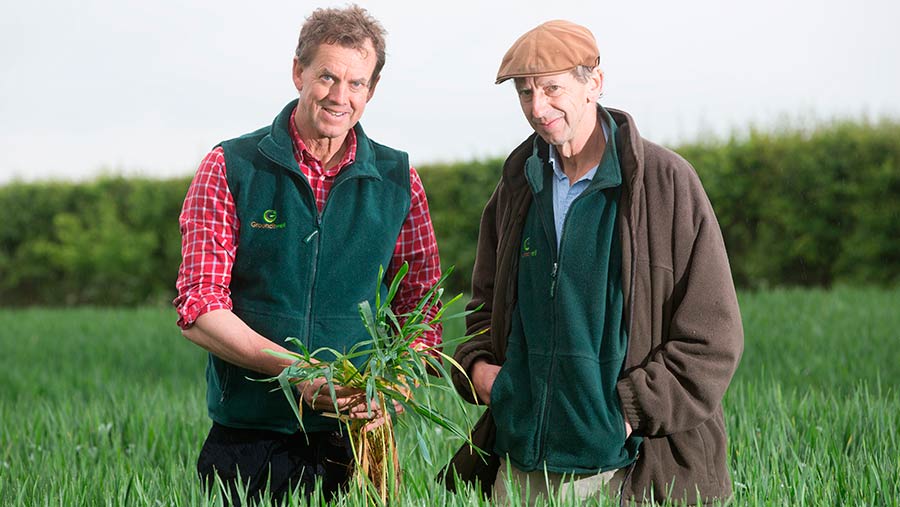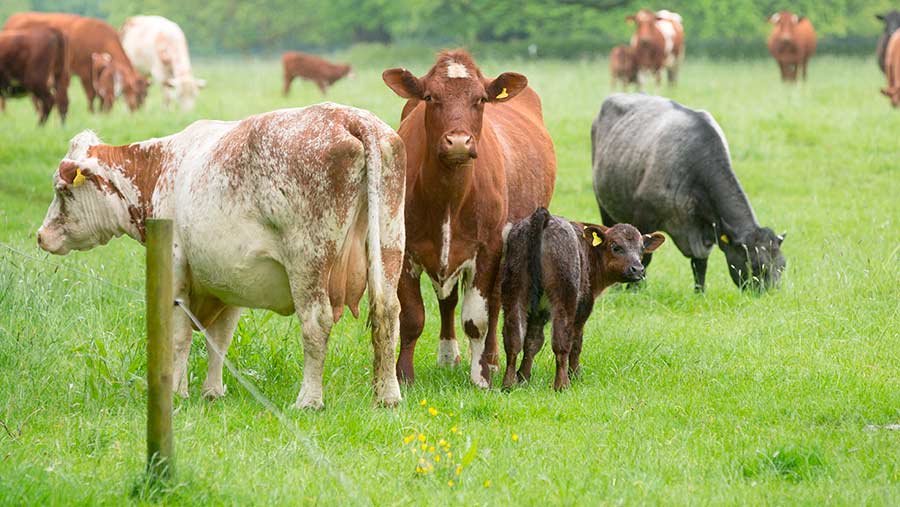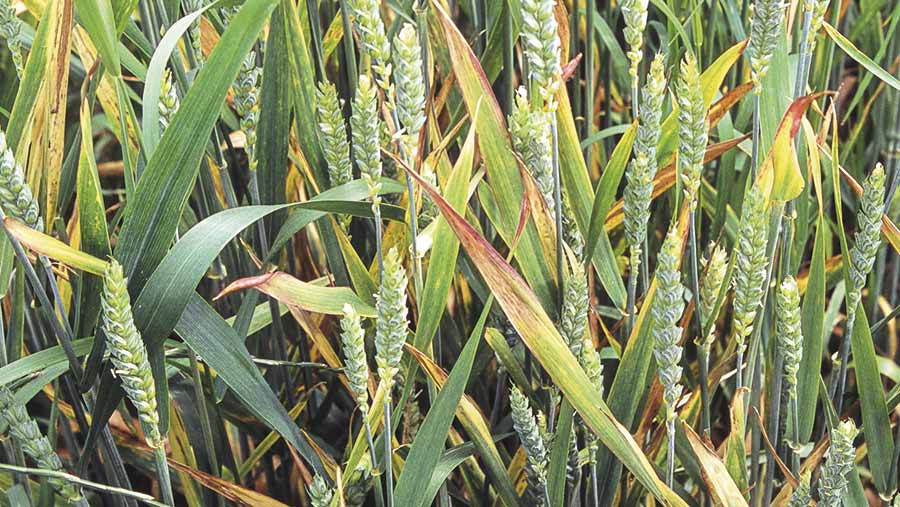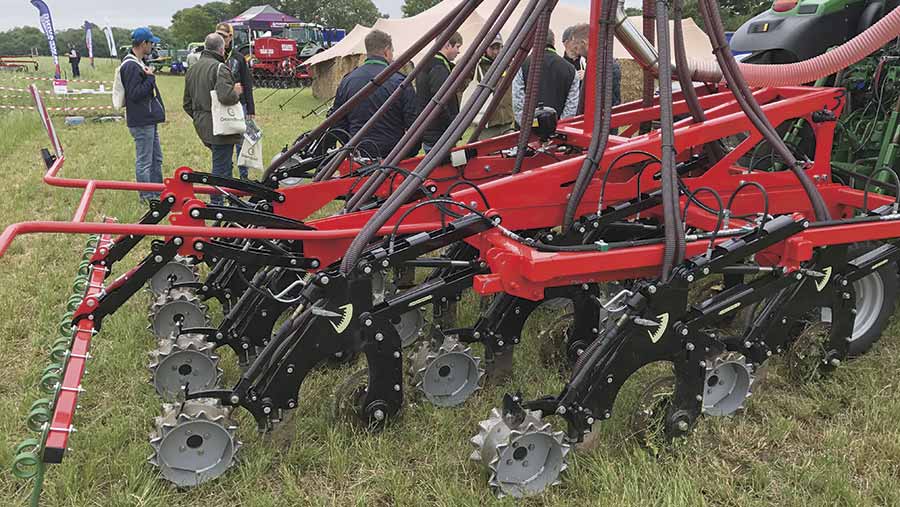Farm’s self-imposed insecticide ban leads to healthier crops
 Paul and John Cherry © Tim Scrivener
Paul and John Cherry © Tim Scrivener John Cherry has not used insecticides on his Hertfordshire farm for three years with no drop in yields as he has encouraged a host of natural predators to feed on any troublesome pests.
The use of cereal seed dressings and foliar insecticides ceased in 2015, and he believes the resulting increase in spiders and ground beetles have kept insect pests under control.
Top winter wheat yields have edged towards 12t/ha on his no-tillage, low-input, growing system with little sign of any yield-damaging aphid-spread diseases on his heavy land farm.
“The crops look better than ever and the key is having enough natural predators, as we are trying to work with nature rather than against it,” he tells Farmers Weekly.
See also: Kent grower sees top rapeseed yields without using insecticides
Improving soils
Increased cattle numbers, the adoption of no-till and a more diverse rotation have all helped to improve his soils, worm numbers, insects and bird life on his farm, which hosts the annual Groundswell non-tillage event.
He has in the past used neonicotinoid seed dressing on his winter wheat, such clothianidin (Deter), or pyrethroid sprays in the autumn if there was a risk from the aphids which spread the potentially destructive disease barley yellow dwarf virus.
But now he has abandoned this approach, saving him money, while his farm’s cool altitude at 450ft above sea level may help him avoid the worst aphid attacks.
He has become more and more interested in his soils, and has watched as more beneficial insects encourage a greater number of songbirds which allow raptors such as sparrowhawks, merlins and red kites to thrive.
“As the soils become healthier and the rotations wider, the cropping will become healthier and the weed pressure less,” he says.

© Tim Scrivener
Giving up ploughing
This journey started in the year 2000 when Mr Cherry gave up ploughing on the 1,000ha farm he runs with brother Paul, based at Darnalls Hall Farm, just south of Baldock in north-east Hertfordshire.
The move to abandon the plough was prompted by a desire to save diesel, metal and time, but very soon the switch to minimal tillage saw worm numbers rise and soil organic matter increase.
The result was more workable soils, as the less his chalky boulder clay soils are disturbed the more they were mimicking nature, rather than fighting it, and just over a decade later the farm was ready to take the plunge and go zero-till.
New techniques were needed to grow oilseed rape as he wanted to use minimal slug pellets and preferably none at all, while banned neonicotinoid seed dressings which also can deter slugs were out of the question.
Oilseed rape was abandoned for two years due to high cabbage stem flea beetle numbers, but when the crop returned he decided to use companion crops such as buckwheat, linseed and sunflowers to attract the beetles rather than feed on the rapeseed.
“Where it has worked it seemed the companion crop has confused the flea beetles and the pigeons,” he says.
Resistance problems
Neonicotinoid seed treatments had given good control of flea beetles on the farm, while he was aware of resistance problems with using pyrethroid sprays in the autumn.
In his second year back into oilseed rape, Mr Cherry’s growing strategy is developing and last summer 28ha of rapeseed was drilled then sprayed immediately with glyphosate as a pre-emergence herbicide.
No other agrochemicals were applied in the autumn so the crop can be assessed whether it is a viable one and than treated with herbicide AstroKerb (propyzamide + aminopyralid), or simply used as a cover crop over winter.
Controlling slugs
Slug damage can be limited in the following winter wheat crops by allowing oilseed rape volunteers to emerge and grow to as high as 300mm before direct drilling wheat and then spraying glyphosate to kill the oilseed rape.
“The slugs will eat brassicas, such as oilseed rape volunteers, rather than the wheat,” he says.
Wheat yields across the farm average 8t/ha, and this year he is growing 240ha of milling variety Crusoe with a relatively low level of nitrogen fertiliser at 180kg/ha, while he uses slightly higher seed rates as most seed is farm-saved.
Natural predators also play a part in controlling slugs, rather than using molluscicides, with ground beetles hoovering up slug eggs and flocks of starling picking off the adult slugs.
Again, Mr Cherry admits slug control could be easier on his farm in the drier eastern half of the country rather than the wetter West, but his reluctant to use them is reinforced by his fears that they may also kill beneficial insects.

© Blackthorn Arable
Blackgrass problems
The one problem that has arisen with a move to min-tillage and then no-tillage is weed problems caused by blackgrass, so a different strategy was needed.
The answer was more spring cropping to give time in the autumn to control the grassweed and an expanded cattle enterprise to incorporate herbal leys into the rotation.
“It’s a cheaper way to control blackgrass by using rotation, spring cropping and herbal leys,” he says.
His Beef Shorthorn suckler herd and followers now number 330 and they graze 170ha of permanent pasture, while 40ha of four-year herbal leys have been introduced and mob grazed to improve soil fertility.
The expanded herd fetches a beef premium at supermarket chain Morrisons, while increased grassland on the farm has led to an increase in soil organic matter.
Straw chopping
The next step is to push up the fertility of his soils. He already chops most of his wheat straw to improve organic matter and bales his barley and oats straw for the livestock.
He is looking to cut fertiliser use with more herbal leys and manure from the cattle and then try to cut back on fungicide use as he believes his crops are more healthy in a no-tillage, low input system.
The move to no-till and greater cattle numbers has halted the use of phosphate and potash applications on farm, and the next aim will be to trim back on nitrogen fertiliser use.
“We are already using no fertiliser on our grassland which is producing plenty of clover so the next step is to cut back on nitrogen on our arable crops,” he says.
Groundswell

© Edd Mowbray/RBI
The farm is to hold its third annual Groundswell event this June focusing on no-tillage farming and also bringing grass-fed livestock back on to the arable farm.

